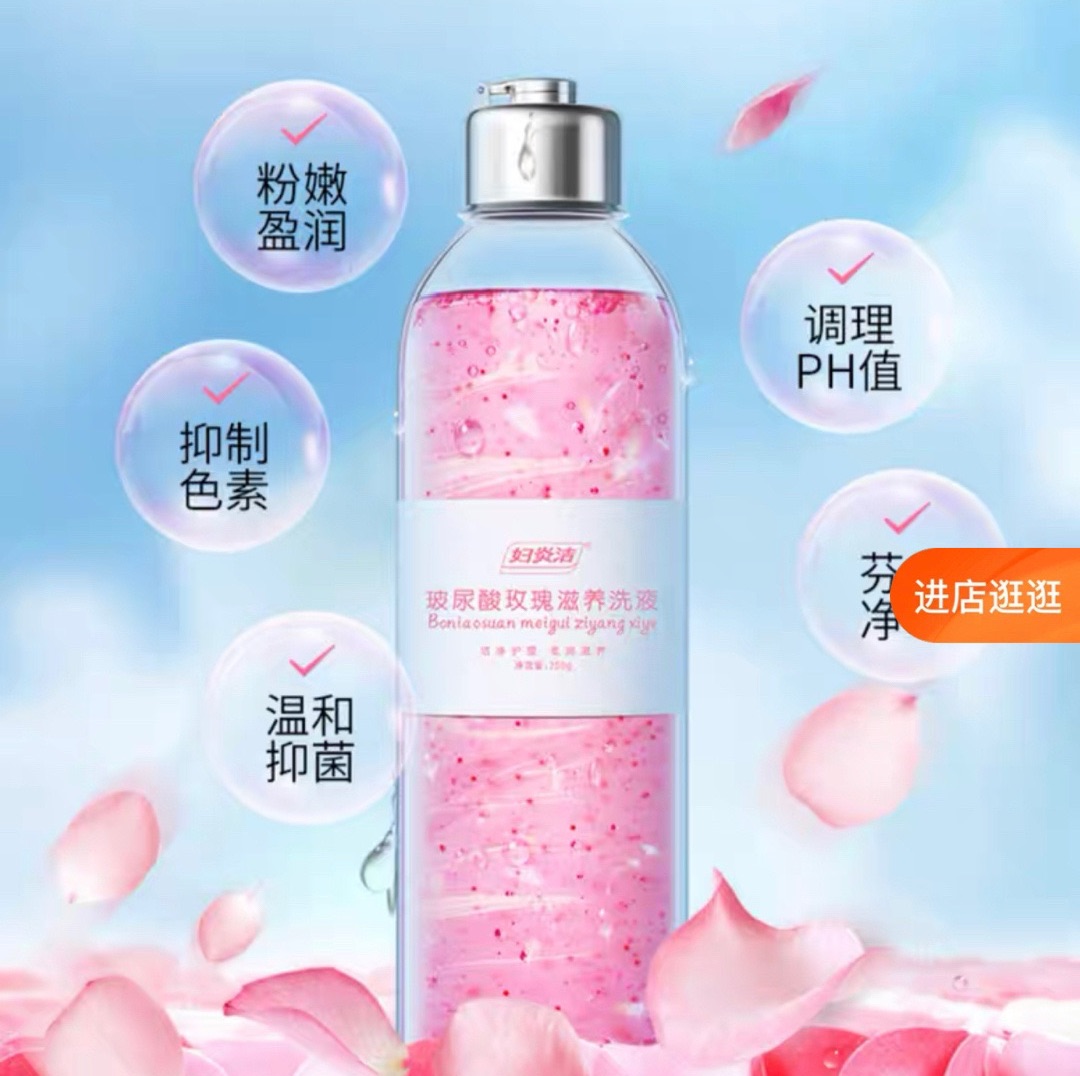Chinese feminine care brand under fire over ‘intimate wash’
Fed up with society’s ever-evolving beauty standards, Chinese women are lashing out at a product that promises to improve their private parts.

Enlarge the eyes, heighten the nose bridge, reshape the ears like an “elf,” remove the muscles from the calf, slim down the waist, shave the body hair…and now, the latest: brighten the vagina.
Fùyánjié 妇炎洁, a leading Chinese personal care brand, has baffled and outraged the Chinese internet with a controversial advertisement (in Chinese), posted to Weibo on May 17, that claims one of its new products can “suppress dark tissues” and “remove odor-causing bacteria” in the vagina. Multiple taglines for this Hyaluronic Acid & Rose Flourishing Intimate Wash are included in the now-deleted post, with one reading, “Wash and bring out a ‘girl’s pink.’”
Quoting an unsourced survey, the brand claims in the post that about 83 percent of men in China, Japan, and South Korea are unwilling to perform oral sex on their partners because their vaginal parts are “too dark and stinky.” “No matter how good-looking these women are, they can’t experience the joy of being treated like queens,” reads an infographic that shows the survey’s results.
For women who are dissatisfied with their “loose, dry, and dark” vagina, the company advised them to reduce activities like working out, which might lead to excessive friction in their private parts. Wearing skinny pants and having too much sex are two of the main factors causing darkening of the vulva, the post claims. But it offers no assurance of the safety and effectiveness of its product.
One of the top-voted comments on social media called out (in Chinese) the problematic nature of the post: “Is it not clear enough that your target customers are women and it’s us who keep your business afloat?” Others commenters called the post “a blatant insult” to women.
Medical experts also criticized the brand for spreading dubious claims and perpetuating some common myths regarding female anatomy. In a direct rebuttal to Fuyanjie, Dingxiang Doctor, a health-focused anti-misinformation platform that has nearly 6 million followers on Weibo, wrote (in Chinese) on May 17 that although certain vaginal odors or discharge may be a sign of a health problem, it’s perfectly normal for a vagina to have a light scent and produce small amounts of fluid. It also pointed out that the shape, size, and color of the vulva varies from person-to-person, and it’s subject to change as one ages. “Health aside, a woman’s intimate part shouldn’t be judged by any standard,” it said.
Fuyanjie issued an apology (in Chinese) on May 20, saying that an internal investigation was underway and that it had recalled the product. “We sincerely apologize for the inappropriate content that disrespected women,” the company wrote. “We accept all the criticism.”
Founded in 1998 — when talking about sexual wellness and vaginal health was taboo — Fuyanjie is practically synonymous with feminine hygiene care in China, standing firmly for decades as the second-largest Chinese brand in terms of market share.
But the brand’s advertising history reveals a troubling pattern of unsubstantiated claims, inflammatory statements, and body-shaming undertones. Back in 2009, in a campaign targeting consumer products falsely advertised as approved medicines, the former Ministry of Health released a list of items accused of misleading customers, and Fuyanjie’s vaginal wash was one of them. Critics argued that the name of the brand, which roughly translates to “female inflammation cleaning” in English, gave off the wrong impression that its products could actually cure genital infections. In 2016, the brand came under fire for an intimate wash whose packaging said, “I can’t wash away your past, but I can make your future clean.” On Chinese social media, the tagline was roundly slammed.
As many commentators pointed out in light of the recent controversy, the core appeal of Fuyanjie’s products also carries a deep shade of colorism. Although a string of cosmetics giants, such as L’Oréal and Unilever, have rebranded or pulled skin-whitening products in the wake of a global racial reckoning, skin-lightening is still a big business in China, where a paler complexion is considered to be desirable and indicative of a privileged class. This aesthetic preference is also reflected in Fuyanjie’s most iconic commercial, where a Chinese couple and a white couple bond at a supermarket over their liking for the brand. “I also use Fuyanjie,” the white actress says in broken Chinese after spotting a Fuyanjie product in the Chinese woman’s shopping cart.
When it comes to women’s private parts, darkness adds an extra layer of “shame” in China, as many Chinese men believe the persistent (and debunked) myth that the color of a woman’s labia indicates her sexual experience. A derogatory internet slang for promiscuous women is “black fungus” (黑木耳 hēimùěr), while female virgins are called “pink fungus” (粉木耳 fěnmùěr). “It reminds me of the same group of people who would categorize women as either ‘black fungus’ or ‘pink fungus,’” a Weibo user wrote (in Chinese) in reference to Fuyanjie’s ad.






